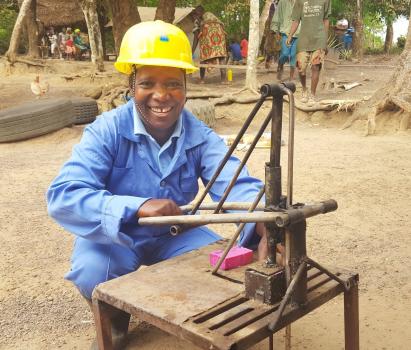The Next Step for USAID’s Water Security, Sanitation, and Hygiene Investments: Diversifying Partnerships
Water security, sanitation, and hygiene are more important than ever before as the world grapples with COVID-19 and looks ahead to recovering from its huge economic impact. Neither are possible without reliable and safe water, sanitation, and hygiene—and the systems that deliver them to people around the world. USAID is launching a new era of investments to strengthen both.
Last week, we released a new partnership approach, called Diversifying Partnerships in Water, Sanitation, and Hygiene (DiP-WASH). This is an exciting tool that will add to the innovative approaches USAID is leveraging to maximize our impact on water security, sanitation, and hygiene. I’m thrilled to launch this effort as one of my first acts as USAID’s Acting Global Water Coordinator.
The DiP-WASH Annual Program Statement lays out broad priorities that will then be customized to national and local contexts by USAID Missions or other Agency teams to help them meet their objectives under Water for the World and the U.S. Government Global Water Strategy.
DiP-WASH seeks to go beyond business as usual by focusing on persistent barriers in the water security, sanitation, and hygiene (WSSH) sector through four objectives that demand we bring new expertise and new partners to the table:
- Increased Accountability and Inclusivity of WASH and Water Resources Management Governance
- Increased Professionalization of WASH Service Delivery & Water Resources Management Authorities
- Improved Water Resources Management and Increased WASH Service Quality Along the Full Service Ladders
- Stronger WASH Markets
To address complex WSSH challenges, we need to support those leading their own development—for example, by bringing new and traditional partners together to exchange knowledge and empower local organizations to meet their objectives, or by challenging gender and social norms, laws, market structures, and policies that create barriers to equitable access to sustainable services.
To complement the Water and Development II (WADI II) acquisition we recently launched, DiP-WASH gives space for creative approaches unlike anything USAID has done before. Through DiP-WASH, we can focus on specialized capacities, expertise, and partners that aren’t ordinarily prioritized; on diversity, equity, and inclusion in all of the activities DiP-WASH supports; and on making bold pushes to close some of the sector’s biggest gaps, such as financing for operations and maintenance, or data quality and surveillance capacity.
While it is forward-looking, DiP-WASH also builds on past successes and lessons learned. In 2013, USAID launched a series of ex-post evaluations on previous WSSH projects to improve our future investments. The results of these evaluations—coupled with evidence and analysis from our current programming—informed a new series of technical briefs that recommend new approaches to common water security, sanitation, and hygiene problems, and a new research agenda that lays out questions on how we can maximize the impact of our investments. Together, these products represent our commitment to challenging ourselves and our partners to more strategically and effectively achieve universal access to drinking water and sanitation and to contribute to a water-secure world. DiP-WASH is another step on this journey.
DiP-WASH seeks to address challenges that I’ve experienced first-hand during my decades in international development. Having spent a good chunk of my career spearheading local capacity development, I’m particularly excited about the many creative ways that DiP-WASH might contribute to better policies for those most likely to be left behind, more robust civil society engagement, and stronger systems that can withstand climate change, pandemics, and anything else the world throws at them. These are the persistent barriers to sustainable water security, sanitation, and hygiene that USAID has sought to address since 2008. With DiP-WASH, we are positioned to have an even greater impact. I hope our implementing partners around the world, no matter their size or experience working with USAID, will keep an eye out for Mission-led efforts to take action on the agenda laid out by DiP-WASH. Our vision for the future of WSSH will only work if a diverse set of partners joins us.
By Maura Barry, USAID Bureau for Resilience and Food Security/Senior Deputy Assistant Administrator & Acting Global Water Coordinator


